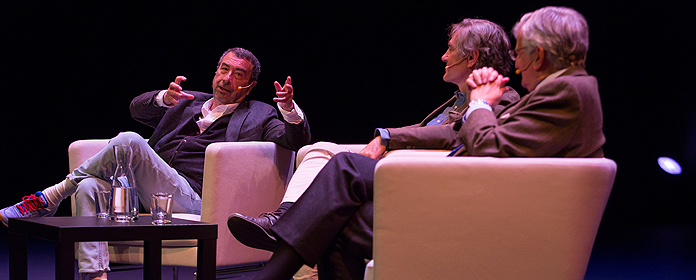José Luis Garci: "Cinema will end up in museums".
The filmmaker shared a meeting with film critic Eduardo Torres-Dulce at the University of Navarra Museum, where they talked about literature on the big screen.

The filmmaker José Luis Garci and the film critic Eduardo Torres-Dulce have held a meeting in the Theater of the Museum of the University of Navarra in front of 200 attendees. In the colloquium, framed within the film program of the Cartographies of Music series, they discussed adaptations of literary works to the big screen. The colloquium was moderated by Rafael Llano, director of Public Programs, research and teaching of the Museum.
Garci, who has adapted works by Benito Pérez Galdós such as El abuelo or the Episodios Nacionales in Sangre de Mayo, pointed out that "literature is a good field for making films, especially theater". He also pointed out films like Luis Buñuel's Tristana , which he described as "extraordinary": "It is the adaptation in image of what you feel when you read Galdós. Adapting is a special gift".
In this sense, Torres-Dulce stressed the difficulty of transferring a literary work to the big screen and reminded that "you have to respect the idea of the work". The critic pointed out some outstanding adaptations such as Visconti 's The Leopard or Martin Scorsese's The Age of Innocence: "There are films that you can't stop watching". About the latter, he pointed out that "it is very difficult to adapt. He and his screenwriter managed to transfer that world of aristocracy and subway relationships. It's all there.
He also recalled two novels that Garci himself wanted to make into films but the projects did not go ahead: El hereje by Miguel Delibes and La sombra del viento by Carlos Ruiz Zafón.
Regarding scriptwriting and shooting, the filmmaker pointed out that "they are like blueprints. When it's right, you can improvise on set. Everything is perfect. It's like telling a joke well. Torres-Dulce illustrated this idea very well with a curious anecdote from Casablanca: "They knew how the film ended, but not how to solve it. The mythical ending came on the way to the studio".
Future of cinemaOn the future of cinema, Garci has pointed out that "I'm over the fact that there are no cinemas, that's old now. Twenty years ago it was another world. Everyone before has great things. And that is what should not be lost. We have to incorporate into the future, which has already arrived, the good things of the past and keep them. They have to coexist. In this sense, he added that "cinema will end up in museums, a place for the seventh art, and it will also be at home, naturally".
Asked about El crack 3, his new film, the director explained that he shot it in five weeks with "a great team of young people", although he felt "nostalgic" when he remembered his colleagues from other films. It is expected to be released in September. "It was a very fluid shoot, fast, and this makes you think of another film, another plot. If there are possibilities, if I'm still well and with enthusiasm, I'll make it. At my age - he's 75 - everyone in Hollywood had already retired. Cinema is hard, but on a film set I feel at home," he explained.




